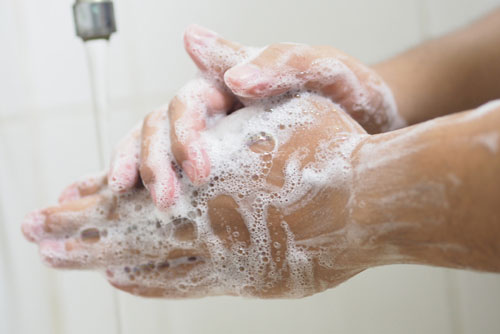Unless you live in a remote region, it’s no longer a matter of if, but when, the coronavirus reaches your area. There are now confirmed cases in all but a handful of states.[1]
What should you do when someone close to you—say a co-worker or family member—gets coronavirus?
Here are five things you can do to stay healthy when others around you are getting sick…
There’s no reason to panic. The vast majority of cases are not life threatening. And many of the same protective measures used against the flu will work to keep the coronavirus at bay.
- You’ve Heard It Before, But It’s True…
Handwashing is the single most important preventive measure you can take.
Wash your hands after every contact with the sick person, their room and bathroom, and any items he or she has used…like a dish, cup, or towel.
Don’t touch your face before washing your hands. This is easier said than done. On average, people touch their face two or three times a minute, which grants the flu virus easy access through your eyes, nose, and mouth. Make a conscious effort to avoid doing this.
Here’s the best technique for washing hands.
Don’t use soaps labeled “anti-bacterial” or “anti-microbial.” They are not any more effective than plain soap. And they likely contain triclosan.
It’s a chemical linked to a cancer and thyroid problems.
Keep alcohol-based hand sanitizer at the ready for times when handwashing is inconvenient or you don’t have access to a faucet.
Create a Sick Room
Quarantine may seem cruel, but you can drastically reduce the risk of infection spread by keeping your sick relative in a separate bedroom away from common areas like the kitchen and family room. If possible, restrict him or her to a separate bathroom that everyone else avoids for the duration of the illness.[2]
Only one person—a designated caregiver—should have access to these areas. The sick room should be stocked with essential items such as tissues, a trash can, medicine, and bottles of water.
The designated caregiver should avoid face-to-face contact with the sick person. Try to stay six feet away. When holding sick children, it’s important to place their chin on your shoulder so they will not cough in your face.
Sick people should be encouraged to cover their mouths and nose with a tissue and put the tissue in the trash right away. If a tissue is not available, they should be encouraged to cough or sneeze into the crook of their elbow, not their hand.
- Forget Sharing
That means not sharing any personal items, even with people who seem healthy. These include:
- Food, drinking glasses, and utensils
- Combs, brushes, and clothing (including hats and scarves)
- Washcloths and towels
- Pillows and blankets
- Phones and remotes
- Computers
And keep the sick person’s toothbrush separate from other toothbrushes. Throw it away after the person has recovered to prevent re-infection.
- Sanitize Surfaces and Clothes
Clean all surfaces you touch a lot. These include doorknobs, bathroom fixtures, counters, toilets, phones, tablets, and keyboards. Wash clothing using the hot setting. Take off shoes at the door.[3]
- Boost Your Wellness Routine
To keep your immune system in top shape, eat a healthy diet that includes plenty of fruits and vegetables and enough water to prevent dehydration.
Exercise every day and get seven to nine hours of sleep a night.[4]
Research shows adequate vitamin D3 prevents viral infections. And if you do get sick, vitamin D3 may greatly reduce the severity. Take a 5,000 IU supplement daily.
Vitamin C is another powerful immune booster that prevents contagious diseases from taking hold in your body. Studies show that a 3,000 mg daily supplement reduces virus symptoms by 85%.[5]
There’s no doubt the coronavirus is scary. But by following the commonsense measures above, you’ll increase your chances of staying healthy.
Editor’s
Note: If you’re worried about
the coronavirus outbreak, you need to know about “infinite immunity.” It’s a
recent Nobel Prize-winning discovery that gives your body the power to fight
off most infections. You can find out more by reading our monthly journal, Independent
Healing. Go HERE.
Like this Article? Forward this article here or Share on Facebook.
[1] https://www.nytimes.com/2020/03/11/world/coronavirus-news.html?action=click&module=Spotlight&pgtype=Homepage
[2] https://www.cdc.gov/flu/takingcare.htm
[3] https://www.nytimes.com/2020/03/06/health/self-quarantine-coronavirus.html
[4] https://www.everydayhealth.com/hs/fight-colds-and-flu/help-family-stay-healthy/
[5] https://www.institutefornaturalhealing.com/2018/08/the-truth-about-vitamin-c-and-the-common-cold/

